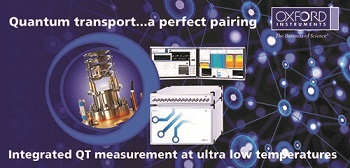Oxford Instruments and SPECS Surface Nano Analysis GmbH have entered an agreement whereby Oxford Instruments NanoScience will be the sole distributor of SPECS Nanonis TrameaTM quantum transport measurement system (QTMS) for applications at ultra low temperatures, below 1 Kelvin.

Quantum transport measurements are widely used in characterising new materials and devices for emerging quantum technology applications such as quantum information processing (QIP), quantum computing (QC) and quantum sensors. Such devices hold the potential to revolutionise future technology in high performance computing and sensing in the same way that semiconductors and the transistor did over half a century ago.
Physicists have long used standard electrical transport measurements such as resistivity, conductance and the Hall effect to gain information on the electronic properties and structure of materials. Now quantum transport measurements such as the quantum Hall effect (QHE) and fractional quantum Hall effect (FQHE) in two-dimensional electron gases (2DEG) and topological insulators – along with a range of other more complex measurements – inform researchers on material properties with quantum mechanical effects.
The ultra low temperatures and high magnetic fields provided by Oxford Instruments’ TritonTM dilution refrigerator make it a key research tool in revealing the quantum properties of many materials of interest. SPECS’ Nanonis Tramea QTMS is a natural complementary partner to the Triton, with its fast, multi-channel measurements.
The Nanonis Tramea quantum transport measurement system offers a novel and superior approach to transport measurements, with high sampling data rates suitable for time-resolved measurement. It provides a measurement speed increase of up to 1000 times compared to conventional measurement systems and in a smaller footprint, together with plenty of signals (up to 24 channels can be acquired simultaneously and independently) and a powerful, customisable user interface able to adapt to today’s and tomorrow’s most sophisticated scientific research.
Because the Nanonis Tramea is a fully integrated digital system, all analogue signals are converted immediately into the digital domain where all signal processing is performed. As such, no interference with external noise or crosstalk is possible, enabling the most sensitive measurements possible.
Quantum transport measurements are typically the first, crucial test made by our customers in characterising their spin or superconducting qubit sample at milliKelvin temperature in a Triton dilution refrigerator. Coupled with the powerful wiring options, puck-loading sample exchange mechanisms, and superconducting magnet integration of the Triton system, the Nanonis Tramea QTMS adds an exciting further dimension in qubit measurement and manipulation.
We are excited to integrate this new high speed, high performance measurement capability from SPECS into our market leading low temperature and high magnetic field environments to offer a unique combination of measurement capability to our customers in quantum technologies and physical science research.
Dr Michael Cuthbert - Managing Director, Oxford Instruments NanoScience
Nanonis nanotechnology measurement solutions are designed for the uncompromising demands of scientific excellence. We are pleased to be working in partnership with Oxford Instruments, who have a world-leading market reach in low and ultra low temperature research tools for physical science.
Dr Ferdinand Bartels - CEO, SPECS Surface Nano Analysis GmbH
The agreement also provides Oxford Instruments with the rights to offer the Nanonis Tramea with its wider range of low temperature research tools.
Oxford Instruments will be revealing the latest developments on its Triton Cryofree® dilution refrigerator at the upcoming DPG (Regensburg, Germany, 6-11 March), APS (Baltimore, MD, USA, 14-18 March), JPS (Tohoku Gakuin University, Japan, 19-22 March) and JSAP (Tokyo Institute of Technology, Japan, 19-22 March) Spring Meetings.
More information on the Nanonis Tramea with Triton can be found at here with further details here.